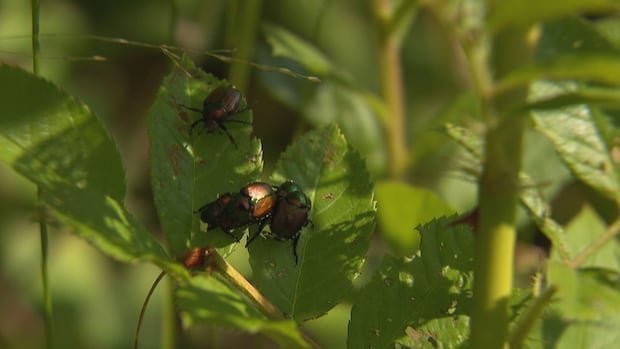In Halifax, gardeners are facing a persistent challenge with Japanese beetles damaging their rose bushes and consuming backyard crops. Shawn Spurr, a long-time gardener in Dartmouth, discovered these small insects on his pea plants, significantly affecting his garden’s produce. The beetles have not only targeted his peas but also attacked his tomato plants, peppers, and possibly his potatoes, leading to substantial damage. Spurr expressed frustration over the situation, emphasizing that this year’s beetle infestation is the worst he has encountered.
Japanese beetles, introduced as an invasive species in Nova Scotia almost a century ago, have seen a recent surge in population growth attributed to climate change-induced warmer temperatures, as noted by Paul Manning, an entomology expert at Dalhousie University. Manning explained that the beetles thrive in human-influenced environments due to their diverse plant diet and highlighted the lack of natural predators keeping their numbers in check.
While various methods have been suggested to combat Japanese beetles, Manning cautioned against relying on insecticides and pheromone traps, noting that these approaches may inadvertently attract more beetles. Instead, he recommended physically removing the beetles by hand during the evening when they are less active and drowning them in soapy water as a more effective strategy.
Acknowledging the labor-intensive nature of manual beetle removal, Alexander Godfrey from Lakeland Plant World in Westphal suggested using pheromone traps strategically placed near affected plants to control beetle populations. Spurr, after initially trying hand-picking, opted for a pheromone trap, noting some success in reducing beetle numbers. However, the source of all captured beetles remains uncertain.
Although Japanese beetles have not yet posed significant threats to large-scale agriculture, Manning highlighted vineyards and hops growers as potentially vulnerable. As the battle against these garden pests continues, the effectiveness of different control methods will be closely monitored by affected individuals and experts in the field.

